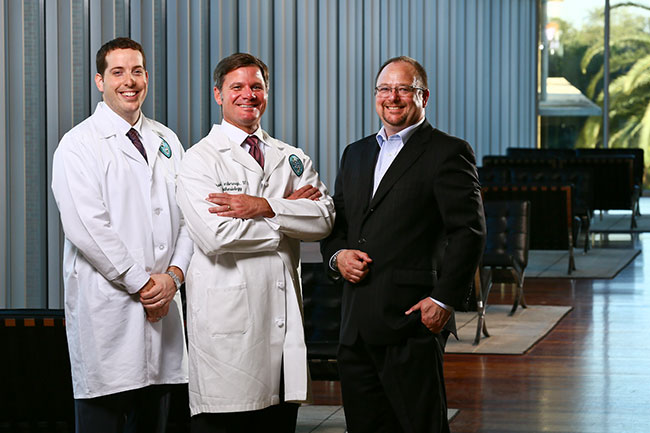Mastering the business of health care
Kenny Wang will begin his residency in emergency medicine this fall, but the Tulane University School of Medicine graduate has career aspirations that go far beyond the ER. Wang hopes to eventually go into academic medicine and one day direct a residency program.

To help achieve that goal, Wang enrolled in the five-year MD/MBA program, a joint offering of the School of Medicine and the A. B. Freeman School of Business that enables medical students to earn a Master of Business Administration with just one additional year of study.
“Having a good business background is important for so many reasons,” says Wang (MD/MBA ’15). “A lot of doctors use business degrees to go into private practice, but I think everyone can benefit from skills like negotiations, leadership and financial management.”
Wang is one of a growing number of students combining medical studies with business in an effort to broaden their skills and fast-track their careers. Since 2003, the number of joint MD/MBA programs in America has grown from 39 to 65. More than 500 students now graduate with dual MD/MBA degrees each year.
“Combining business education with medical education gives students the best of both worlds—the ability to care for patients and the ability to practice in a cost effective manner,” says Dr. Marc Kahn, Peterman-Prosser Professor of Medicine and senior associate dean at the School of Medicine, who helped launch the MD/MBA program 12 years ago.
“It’s partly driven by the complexity and rapid changes we are seeing in the health care industry,” adds John Clarke, associate dean for graduate programs at the Freeman School. “But a business background is valuable in a variety of situations, whether you’re looking to run your practice more efficiently, implement best practices, take on a senior management role, or move out of clinical medicine into consulting, venture capital or private equity.”
Dr. Stephen Newman (MBA ’92) practiced medicine for 15 years before getting his MBA, but he says the decision to pursue a business degree was one of the smartest he ever made.
“The MBA program gave me the foundation I needed to advance my career,” says Newman, who went on to become chief operating officer of Tenet Healthcare Corp., the nation’s third-largest hospital company. “It gave me an in-depth understanding of the business of health care.”
This summer, the Freeman School and the School of Medicine introduced a new four-year, accelerated MD/MBA program to make it even easier for medical students to earn a business degree. The intensive format enables students to earn a medical degree and an MBA concurrently, eliminating the need for an additional year of study.
“Tulane is one of only several schools that allow students to get both degrees in four years,” says Kahn
The accelerated MD/MBA is just one component of the Freeman School’s efforts to serve the city’s rapidly expanding healthcare market, which is expected to add 17,000 jobs over the next 20 years. Other initiatives include electives in healthcare management, the expansion of a Professional MBA scholarship program for anesthesiology residents at the School of Medicine, and a new healthcare specialization within the PMBA program.
“This is all part of a broader strategy to develop a significant healthcare market presence,” Clarke says. “Given what we’re seeing in health care at both the local and national levels, we think it’s a strategy we’re going to be pursuing for many years to come.”
Interested in advancing your education and/or career? Learn more about Freeman’s wide range of graduate and undergraduate programs. Find the right program for you.
Recommended Reading
- Stewart Center hosts first MBA Experience Weekend
- Pierre Conner: The Future of Energy Is Now
- How to Choose an MBA Concentration
- What Will You Learn in an MBA Curriculum?
- Part-Time vs. Full-Time MBA
- Alum leverages MFIN degree to launch investment banking career
- Freeman Graduation Gift Guide
- What Is a Professional MBA? Overview and Career Outcomes
Other Related Articles
- Scientific Inquirer: Why Searching for Truth Online Might Be Making Us More Biased
- WDSU: Gas prices face uncertainty after US strikes on Iran
- Freeman announces new administrative appointments
- International MD/MBA class inspires student to volunteer in Guatemala
- Alum celebrates Pride at Entergy and beyond
- Payments Dive: GENIUS Act is just the beginning
- New Tulane study finds generative AI can boost employee creativity—but only for strategic thinkers
- Tulane study finds smaller companies get kinder online reviews - and empathy is the reason why
